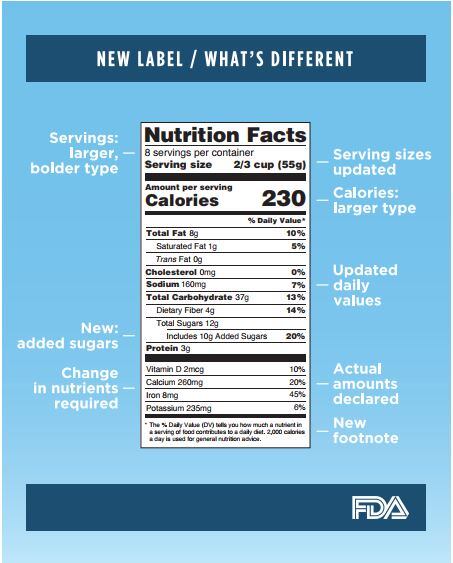The recommended areas for regulatory reform were in response to the FDA’s request to identify regulations that food manufacturers believe should be repealed, replaced, or modified.
Nutrition Facts label compliance extension
The FDA’s changes to the Nutrition Facts will feature a refreshed design that include increasing the type size of calories, servings per contain, and serving

size declarations to help consumers make informed decisions about their food purchases, the agency said.
The FDA already extended the compliance date from July 26, 2018 to Jan. 1, 2020 for manufacturers with $10m or more in annual food sales. Manufacturers with less than $10m in annual food sales have an extra year to comply—until Jan. 1, 2021.
However, the IDFA believes extra time is still needed for dairy manufacturers to meet the new labeling standards.
“While IDFA greatly appreciated and supported FDA’s initial extension of the Nutrition Facts labeling compliance date, IDFA believes that additional time is needed to align the labeling compliance date as closely as possible with the US Department of Agriculture’s (USDA) bioengineered food disclosure standard,” Cary Frye, IDFA senior vice president for regulatory affairs, said.
The USDA bioengineered food disclosure standard, which promotes the labeling of GM foods and ingredients, is aiming for a final rule date of July 2018. However, as the IDFA told DairyReporter, it is unclear what compliance time frame the USDA will issue, and dairy manufacturers will need at least 24 months to complete labeling changes.
Standards of Identity updates
IDFA pointed out that many of the 300 identity standards for food across 20 categories are outdated and do not reflect current processing technology or the operational flexibility needed for future technological development.
Modernizing standards of identity for yogurt, milk, cheese, and ice cream were highlighted by the IDFA. For example, it has requested that ice cream labeling be amended to allow use of milk derived from proteins such as milk protein concentrate (MPC) or ultra-filtered milk and allow use of the term “with other natural flavors” to reflect advancements in flavors.
“Reviewing and revising the existing standards of identity would provide more flexibility, allow for new ingredient uses and reflect current and future technological advances,” Frye said.
“Each of the proposed changes will provide dairy processors with greater flexibility, the ability to create more innovative products and continue to meet consumer expectations.”
Modify FSMA Regulations
The IDFA said that it supports FSMA regulations, as they protect consumers from foodborne illnesses, but many of the requirements are redundant and unnecessary, including the intentional adulteration rule, supply-chain requirements for co-packers, and written assurance requirements.
More specifically, the IDFA is seeking to eliminate “redundant” supplier verification requirements of co-manufacturers when the brand owner verifies the supplier for its own products.
The dairy association would also like to eliminate written assurance requirements “as they do not provide a meaningful food safety benefit and require only disclosure of the need to further process the food for safety through appropriate commercial channels,” IDFA said.
“FSMA regulations represent a paradigm shift in how food is regulated in the US to protect consumers from foodborne illness outbreaks, and our members are dedicated to ensuring that their products are safe, wholesome and nutritious,” Frye said.
“Now that all of the major FSMA regulations have been promulgated, it is clear that in many instances there are duplicative and unnecessary requirements.”
